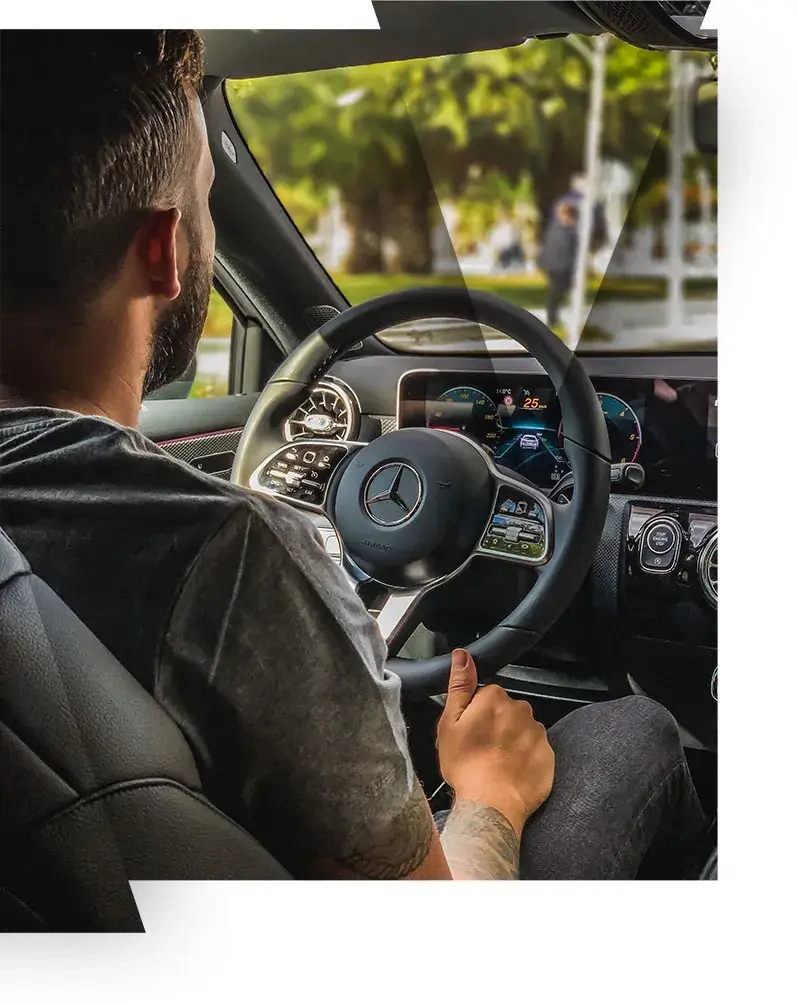92% of people have witnessed at least one road rage or aggressive driving incident in the last year. In the same survey, 89% of respondents said they have been a victim of road rage themselves.
In traffic-heavy cities like Denver, road rage isn’t just frustrating—it can be dangerous. If you find yourself face-to-face with an enraged driver, what would you do?
Here are a few tips for protecting yourself during a road rage encounter, including what to do during and after an incident and when to hire a car accident attorney Denver residents can trust to get the compensation you deserve.
Table of Contents
Understanding Road Rage and Aggressive Driving
Since this is a law blog, let’s start by defining what road rage and aggressive driving really mean:
What is Road Rage?
According to the National Highway Traffic Safety Administration (NHTSA), road rage is “an intentional assault by a driver or passenger with a motor vehicle or a weapon that occurs on the roadway or is precipitated by an incident on the road.”
Colorado ranks fourth in the nation for “Worst Road Rage,” with Denver seeing a sharp rise in incidents. The city’s population growth and increasing traffic make it easier for stress and frustration to build up on the roads. That frustration can quickly turn to road rage, leading to dangerous actions like tailgating, cutting off other drivers, or even physical confrontations.
What is Aggressive Driving?
While road rage involves violent behavior, aggressive driving encompasses a range of reckless actions, like speeding, tailgating, frequent lane changes, or failing to yield. During rush hour, aggressive driving is common on our city’s busiest highways, like I-70 and I-25. However, it can happen anywhere, anytime someone behind the wheel is in a rush or driving unsafely through traffic.
Aggressive driving is a major cause of many traffic accidents and one of the leading reasons for fatal crashes.
What to Do If You’re a Victim of Road Rage
If you become the target of a road rage incident, these steps can help you stay safe.
1. Stay Calm and Avoid Engaging
If a driver is honking, tailgating, or making obscene gestures, don’t engage with them. Responding by making eye contact, making a gesture of your own, or mimicking their behavior can escalate the situation and make it much worse.
It’s not just your safety at risk. Denver’s streets, especially downtown, are often crowded with pedestrians and cyclists. When road rage occurs in these areas, it could put others in danger, too. It’s not worth it. Defuse the situation by keeping your cool and not engaging.
2. Keep Your Distance
If an aggressive driver is following you or driving recklessly near you, try to create space between your vehicles. If you can, safely change lanes or exit the highway. Denver’s many roads offer alternative routes, so use your GPS or take side streets to increase distance.
If the driver continues to follow you, drive toward a Denver police station or another safe location. Don’t pull into an isolated parking or stop in unfamiliar areas.
3. Call the Police
If you feel you’re in danger, don’t hesitate to call 911. The police are trained to handle road rage incidents and may send officers to intervene. When talking to a dispatcher, give them the following information:
- Your location (e.g., street names, nearby landmarks, etc. )
- A description of the vehicle (make, model, and license plate)
- The aggressive driver’s behavior (e.g., tailgating, speeding, etc.)
Busy roads and highways can sometimes delay police response, especially in the winter, when streets can be slick from snow or ice. In the meantime, drive to a safe place, like a local police station.
4. Document the Incident
If it’s safe, try to document the road rage incident, or at least remember key details. Write down the vehicle’s make, model, license plate, and any notable details about the driver that could help the authorities later. This information will be important when filing a police report or talking with an attorney if you’re in a car accident.
Remember which streets you were on when the incident happened. A street camera might have captured the aggressive driver’s actions. Also, consider investing in a dash camera. Whether you’re on I-25 or a side street in Capitol Hill, video footage can provide crucial evidence for police and attorneys.
5. File a Police Report
Even if there was no physical altercation, file a police report after a road rage incident. The Denver Police Department encourages victims of road rage to report these incidents, as it helps them track aggressive driving patterns and work to improve traffic safety.
If you were threatened or your vehicle was damaged, a police report will also help you with any legal claims, like vehicle damage or personal injury.
6. Seek Medical Attention
We cannot emphasize this enough. If you were in an accident, seek medical attention right away, even if you don’t feel injured. The adrenaline rush you experience after an accident can mask pain. Whiplash, concussions, and emotional distress can often take hours or even days to manifest.
Hospitals and urgent care centers can evaluate and treat injuries from vehicle-related incidents. Keep records of your medical visits, as they’ll be crucial for insurance claims or legal action.
7. Get Legal Support
If you’re a victim of road rage that led to damages or injuries, consult a personal injury attorney immediately. Personal injury cases can be complex, and an attorney familiar with Colorado traffic laws can guide you through the legal process, gather evidence, and become your advocate when fighting for the compensation you deserve.
Road rage incidents often lead to accidents, and insurance companies may try to downplay the aggressive driver’s responsibility and make a lowball offer. Experienced car accident attorneys know these tactics and will work to get you what you’re entitled to.
8. Get Emotional Support
No one should navigate the traumas of a road rage incident alone.
Being a victim of road rage can leave emotional scars, such as stress, anxiety, or even fear of driving again. Don’t hesitate to reach out for support. Denver has a variety of mental health resources, including counseling services and support groups for those struggling to recover from a traumatic driving experience.
If you’re unsure where to turn, your attorney can also connect you with resources to help you cope with the emotional aftermath.
How to Reduce Road Rage Incidents
While you can’t control other drivers’ actions, you can reduce your chances of encountering road rage.
- Plan ahead: Traffic can be unpredictable, especially during rush hour or bad weather. Give yourself extra time to reduce stress and avoid feeling like you have to rush.
- Stay patient: Unfortunately, traffic jams are part of life. Whether you’re downtown or on the interstate, try to stay calm and remember that other drivers are probably just as frustrated as you are.
- Use alternate routes: Get familiar with side streets. They may be quicker and less stressful when traffic is heavy.
- Practice defensive driving: Defensive driving can reduce your chances of becoming a victim of road rage. Keeping a safe distance and using your signals can prevent provoking other drivers.
Protecting Yourself on Denver’s Roads
Denver’s a great place to live, but as it grows, traffic and road rage incidents are on the rise. Knowing how to handle these situations can help keep you safe and prevent escalation.
Remember to stay calm, avoid engagement, and keep your distance. These are excellent ways to protect yourself from becoming a victim of road rage.
If an incident occurs, document it, file a police report, seek medical attention, and get the legal and emotional support you need.
The Paul Wilkinson Law Firm Is Here for You
If you’re a victim of road rage and need legal representation, the Paul Wilkinson Law Firm is here to help. Our Denver car accident attorneys can give you the legal representation and support you need to get the compensation you deserve. Throughout our careers, we’ve won over 5,000 cases and work on a contingency fee basis, meaning we only get paid if we win your case.
Are you ready to start your journey to recovery? Contact us today for a free consultation to learn more about our services and how we can help.


